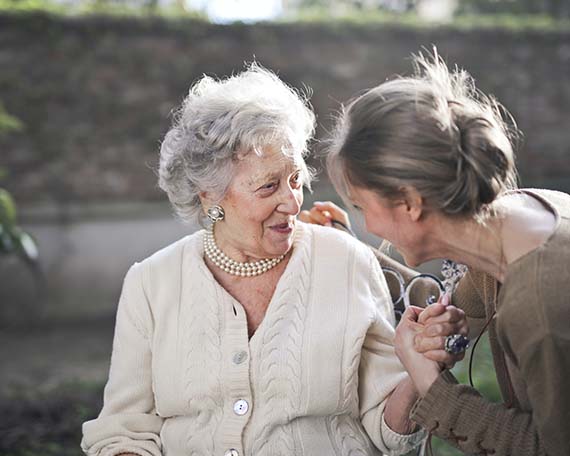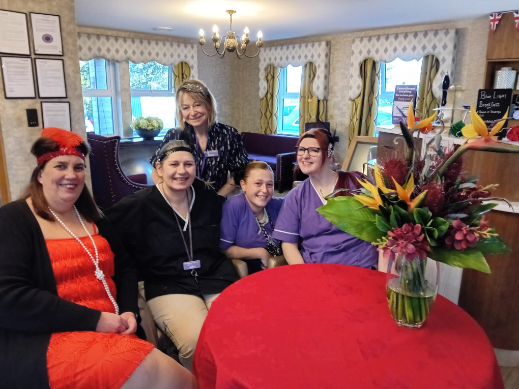How to Get an Elderly Person Into a Care Home

It is a well-known fact that as people age they will need more support in their daily lives, such as with personal care. Some people are offered support within their own homes by a professional carer or a family member. However, when caring for the elderly in their own home becomes difficult due to an increase in the level of care, moving into a care home might be the best option so they can get the support they need, 24 hours a day, 7 days a week.
Care homes will offer different services including residential, dementia, respite care and sometimes more complex support like nursing care. The care home staff understand that trying to move an individual into a home can be quite challenging. So to provide families with peace of mind they will offer support to the family members to ensure that the transition is as smooth as possible.
Within this blog, we explore how to make the transition of moving into a care home as easy as possible for everyone involved.

Discussing A Move Into a Care Home
It is important to have a chat about care homes and what they can offer to the individual considering care and why it would be beneficial over caring for the elderly in their own home. By having these open discussions, you will be able to make the process as smooth as possible and the person seeking care will be able to prepare mentally for the transition.
When having a conversation so openly about care, the elderly person will be more supportive of the idea. The main benefit of moving into a care home is the access to 24-hour care that is provided by professionals who are dedicated to supporting someone's health and well-being. As well as this, living in a care home provides a group living setting which provides older people with social opportunities.
It is important to highlight that someone's independence won't be stripped away from them when they move into a care home but instead, will help them to continue living independently and carry on with the things they love to do. Living in your own home alone when you are old can become very overwhelming and stressful having to maintain a house on your own. Having support 24 hours a day can help individuals overcome this as all chores will be taken care of by care home staff.
Say if your loved one has a complex condition, like dementia, a move into a care home could prove difficult as they won’t think anything is wrong and therefore won’t go willingly. It is important when that a lasting power of attorney is put in place so that decisions can be made on their behalf if they do not have the mental capacity to do so themselves. However, it is still important to involve your loved one in the decision-making process as much as possible so that any stress, concern and confusion can be reduced as much as possible.
Include your Loved One in Decision-Making
During visits to potential care homes, the individual in need of care should be encouraged to ask questions and voice anything they feel concerned about. This gives them the opportunity to be reassured and will help them understand that this transitional phase will be beneficial to them.
A move into a care home should never be sprung onto someone so the individual requiring care should be involved in the whole process where they can feel like they have more control and become familiar with the idea which can reduce any anxiety or concerns. To help the process further, a care home will allow both the care seeker and their loved ones to do an initial visit to see what residential living would be like and if it is the correct care home for their needs.

Assessing the Needs of the Individual
It is very important to assess the person's overall requirements to know exactly what type of care they require. Someone with dementia or nursing needs would not be suitable for a residential care home for example, as their needs exceed the level of care offered.
When visiting a loved one at home you might notice that they are struggling with their everyday tasks and need additional support or you have gotten to the point where caring for the elderly in their own home is becoming increasingly difficult, and they aren't receiving the care they need.
Most care homes will carry out a needs assessment in order to determine the level of care they require and whether they can provide for their needs. The care home management will look into the person's physical health and mental capacity to decipher their care needs and put them in the category of residential, dementia or nursing care.
Researching Different Homes
It is essential that you find the right care home for your family members so they can feel comfortable and settle in as quickly as possible. When researching moving into a care home in Sheffield you should see if they offer the care services that you require and you can look up their latest inspection report to see how they have been graded on certain categories. This will provide you with a great idea of how they operate and treat their residents.
It will be in the care seeker's best interest to do as much research as possible so you can get a true understanding of whether your preferred care home is suitable. Once you have selected a few, it is recommended to visit the home to get a feel of the environment and speak to their current residents about their experience.
Preparing For The Move
For the smoothest move possible, it will always be recommended to plan well in advance to reduce as much stress as possible. You should account for packing, transporting and making their new room their own.
Most care homes will allow their residents to customise their rooms as it is their personal space. This allows them to have a familiar setting and can help them settle into their new surroundings.
Financing The Care Home Costs
Moving into a care home or nursing home is a massive financial commitment and it is important that everyone involved in the process understand the implications. The costs all depend on what level of care is provided, the location of a care home and any extras that that home offers.
Depending on your finances, you might need to seek advice from the local authority or the NHS if a person has a ‘primary health need’. To get this funding from either of these, you must undergo a set of assessments. With local authority, a means test will be carried out to determine whether someone is above or below the financial threshold and with the NHS, a person will have a needs assessment to determine if they qualify for full financial support which is not means tested.
The local council will allocate an amount of money towards care home fees, and if someone chooses a care home that is deemed more expensive than their ‘personal budget’ the local authority will request a ‘top-up fee’ that can be paid by a family member. This will give you the additional support that you require to live in a care home of your choice. It is very important to know that not all care homes accept funding.
Seeking Advice from Care Professionals
You might have a lot of questions during the process of looking for a care home. To get these questions answered, it is recommended to seek professional advice.
You can seek further advice in a number of different ways such as speaking to social services, a care home manager or by reading online resources. By getting your questions answered you will be able to understand more about what to expect which should provide peace of mind for everyone involved.

Exceptional Care Provided By The Porterbrook
The Porterbrook is a care home in Sheffield that offers 44 residents an all-inclusive way of living. The Porterbrook has a range of care services provided 24 hours a day which include Residential, Dementia and Respite Care within a luxurious environment.
The Porterbrook Care Home has a dedicated team of care professionals who are committed to making sure that each resident lives the life that they deserve. We are able to achieve this by providing a loving and supportive environment to not only our residents but their families and our staff members. Our staff are passionate about providing person-centred care to not only improve the person’s health but their mental, physical and emotional well-being.
To support and motivate residents we offer a range of facilities for a number of interests. Our residents can pick and choose what they do day to day whether it's using our in-house cinema room, getting involved in some arts or going to the salon to get some beauty treatments and a pamper, they can do just that.
Get In Touch To Find Out More
Deciding when is the right time to look at moving a loved one into a care home can be incredibly overwhelming.
At The Porterbrook Care Home, we understand that it is not an easy decision to make, which is why our senior care team is always available to offer their professional advice and guidance in helping you make the right decision for you and your family. Contact the team via our contact form or by emailing manager@theporterbrookcare.com or by calling 0114 266 0808 and a member of the team will be delighted to assist you.





